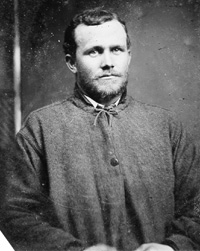James Willson Letters
James Willson (sometimes with one ”l”, sometimes two), was born in East Warren, Vermont, probably in 1842. His father was Henry S. Willson, a farmer, who died February 28, 1862; his mother was Rosaline Hillery Willson, who later married a Horace Steele. She died September 28, 1896. His mother’s parents were Robert Hillery, born about 1797, died December 23, 1876, and Lepha (or Leaffey) Hillery, born about 1799, died December 17, 1875. The Hillery farm was probably in Warren, though perhaps it was further down the Mad River Valley.
James Willson joined Company B, 13th Regiment Vermont Volunteers, in October 1862, for a nine month enlistment. He hoped to take over his grandfather Hillery’s farm when he returned from the war, as he mentions in a number of the letters. Unfortunately Willson’s time was extended and he was killed at Gettysburg on July 3, 1863. According to the History of the 13th Regiment Vermont Volunteers, he was killed while helping a wounded soldier from the field. The same source indicates that Willson had had a premonition that he would not survive the war.
His body would eventually be returned to the East Warren cemetery. His girlfriend, perhaps fiancée, Delia (Fidelia) Porter, aged 17 per the 1860 census, died February 22, 1864, some say of a broken heart.
 In his letters, Willson wrote of camp life, his health, how others from home were surviving military service. He expressed interest in what was happening at home, mostly writing to his mother, (his father had just died), but some to his sister and brother. He also expressed interest in taking over his grandfather’s farm on his return. A letter of November 23rd describes his visit to the Bull Run battlefield, talking of weapons found, skeletons, etc. A letter to Melville Eaton in January describes the hardships of army life, as he tries to dissuade Melville from entering the service. A March 11th letter speaks of General Stoughton being captured, “and the Second Vermont Brigade don’t care much.” On May 10th he speaks of General Stannard reviewing the troops. “We like his appearance first-rate. He does not appear much like General Stoughton. I hear that he Stoughton has been exchanged and that he is in Washington. All we ask is that they will keep him there and not give him the command of this Brigade again.” June 21st his mother writes from Fayston, “there have been some twenty or thirty run away from this town and Waitsfield to get rid of the draft.”
In his letters, Willson wrote of camp life, his health, how others from home were surviving military service. He expressed interest in what was happening at home, mostly writing to his mother, (his father had just died), but some to his sister and brother. He also expressed interest in taking over his grandfather’s farm on his return. A letter of November 23rd describes his visit to the Bull Run battlefield, talking of weapons found, skeletons, etc. A letter to Melville Eaton in January describes the hardships of army life, as he tries to dissuade Melville from entering the service. A March 11th letter speaks of General Stoughton being captured, “and the Second Vermont Brigade don’t care much.” On May 10th he speaks of General Stannard reviewing the troops. “We like his appearance first-rate. He does not appear much like General Stoughton. I hear that he Stoughton has been exchanged and that he is in Washington. All we ask is that they will keep him there and not give him the command of this Brigade again.” June 21st his mother writes from Fayston, “there have been some twenty or thirty run away from this town and Waitsfield to get rid of the draft.”